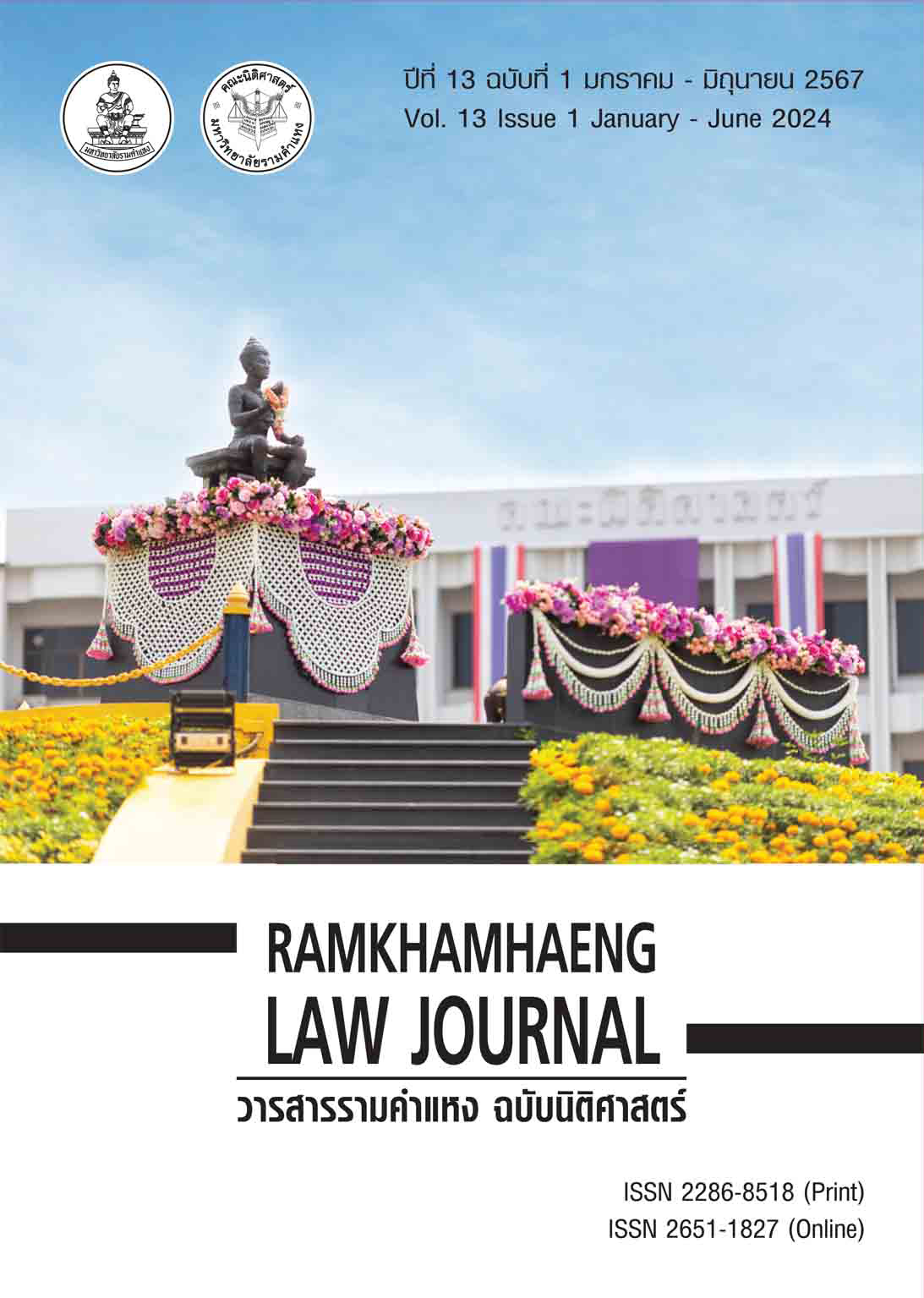สภาพบุคคลตามกฎหมายของปัญญาประดิษฐ์ จำเป็นหรือไม่ ?
Main Article Content
Abstract
ปัจจุบันแนวความคิดเรื่อง สภาพบุคคลตามกฎหมายสำหรับปัญญาประดิษฐ์ เป็นหัวข้อที่มีความสำคัญเพิ่มมากขึ้นในขอบเขตทางกฎหมายและจริยธรรม คำถามพื้นฐานที่ว่าปัญญาประดิษฐ์ควรมีสภาพบุคคลตามกฎหมายหรือไม่ นำมาซึ่งการพิจารณาปัจจัยต่าง ๆ เช่น จิตสำนึกของปัญญาประดิษฐ์ การตระหนักรู้ในตนเอง และศีลธรรมของปัญญาประดิษฐ์ โดยเฉพาะความซับซ้อนในการกำหนดคุณลักษณะว่าหลักเกณฑ์ใดที่ปัญญาประดิษฐ์ควรมีสภาพบุคคลตามกฎหมาย หลายประเทศมีกฎหมายเกี่ยวกับปัญญาประดิษฐ์ หากแต่ยังมิได้มีการกล่าวถึงสภาพบุคคลของปัญญาประดิษฐ์ในทางกฎหมายแต่อย่างใด แต่โดยส่วนใหญ่จะมุ่งเน้นไปที่การใช้งานที่มีความโปร่งใสปราศจากอคติ การใช้งานอย่างมีความรับผิดชอบ และการปกป้องข้อมูลส่วนบุคคล เป็นหลัก
วิวัฒนาการของแนวคิดในการให้สภาพบุคคลแก่สิ่งหนึ่งสิ่งใดที่มิใช่มนุษย์มีมาอย่างต่อเนื่องยาวนานบนพื้นฐานของเหตุผลที่แตกต่างกัน เช่น การให้สภาพบุคคลกับทาสในสมัยโบราณ การให้สภาพบุคคลกับบริษัท การให้สภาพบุคคลกับแม่น้ำ (แม่น้ำวังกานุย เมืองมานาวาตู ประเทศนิวซีแลนด์) การให้สิทธิทางกฎหมายแก่ทะเลสาบ (ทะเลสาบอีรี เมืองโทลีโด รัฐโอไฮโอ ประเทศสหรัฐอเมริกา) เป็นต้น ซึ่งสภาพบุคคลที่กฎหมายกำหนดให้เหล่านั้น นำมาซึ่งสิทธิ หน้าที่ และความรับผิดตามกฎหมายในเวลาต่อมาด้วยเช่นกัน เช่น สิทธิในการถือครองทรัพย์สิน สิทธิในการฟ้องร้อง หรือถูกฟ้องร้องดำเนินคดีในกระบวนการยุติธรรม เป็นต้น
หนึ่งในประเด็นสำคัญที่สนับสนุนให้ปัญญาประดิษฐ์มีสภาพบุคคลตามกฎหมาย ก็คือ “ความรับผิดชอบ” เนื่องจากปัจจุบันระบบปัญญาประดิษฐ์ถูกสร้างและดำเนินการโดยมนุษย์ ซึ่งหมายความว่าระบบเหล่านี้อยู่ภายใต้การควบคุมดูแลโดยมนุษย์ อย่างไรก็ตาม เนื่องจากเทคโนโลยีปัญญาประดิษฐ์มีความก้าวหน้า ทำให้ปัญญาประดิษฐ์สามารถคิดและตัดสินใจได้เอง จึงกลายเป็นเรื่องยากมากขึ้นสำหรับมนุษย์ที่จะรับผิดชอบอย่างเต็มที่ต่อการตัดสินใจหรือการสร้างสรรค์ของปัญญาประดิษฐ์ ดังนั้น หากปัญญาประดิษฐ์ได้รับสภาพบุคคลตามกฎหมาย ก็หมายความว่า ปัญญาประดิษฐ์สามารถรับผิดชอบต่อการกระทำและการตัดสินใจของตนได้ สิ่งนี้จะผลักภาระความรับผิดชอบจากมนุษย์ไปสู่ระบบปัญญาประดิษฐ์เอง อันเป็นสิ่งที่สำคัญและจำเป็นอย่างยิ่งสำหรับระบบปัญญาประดิษฐ์ที่สามารถทำการตัดสินใจหรือดำเนินการได้เอง
หนึ่งในประเด็นสำคัญที่คัดค้านมิให้ปัญญาประดิษฐ์มีสภาพบุคคลตามกฎหมาย ก็คือ “นักพัฒนาและผู้ผลิตอาจละทิ้งความรับผิดชอบ” เนื่องจากปัจจุบัน นักพัฒนาและผู้ผลิตต้องรับผิดชอบต่ออันตรายใด ๆ ที่เกิดจากระบบปัญญาประดิษฐ์ของตนที่ได้พัฒนาหรือสร้างขึ้น ดังนั้น หากปัญญาประดิษฐ์ได้รับสภาพบุคคลทางกฎหมายแล้ว ความรับผิดต่างๆ อาจถูกถ่ายโอนมายังปัญญาประดิษฐ์ได้ ทำให้นักพัฒนาและผู้ผลิตมิได้ให้ความสำคัญกับความรับผิดชอบของตนอย่างเต็มที่
คำตอบของคำถามที่ว่า สภาพบุคคลบุคคลตามกฎหมายของปัญญาประดิษฐ์จำเป็นหรือไม่ ? นั้น ในวงการวิชาการปัจจุบันก็ยังไม่มีความชัดเจนเพียงพอ และยังไม่มีประเทศใดที่รับรองสภาพทางกฎหมายของปัญญาประดิษฐ์อย่างเป็นทางการ กับทั้งฝ่ายสนับสนุนและฝ่ายคัดค้าน มีประเด็นประกอบหลักเหตุผลที่หนักแน่นด้วยกันทั้งสองฝ่าย หากแต่เป็นมุมมองที่แตกต่างกันเท่านั้น การให้สภาพบุคคลกับปัญญาประดิษฐ์เป็นประเด็นที่ซับซ้อน ละเอียดอ่อนที่ต้องอาศัยความรอบคอบอย่างยิ่ง เนื่องจากเป็นประเด็นที่จะต้องคำนึงถึงผลกระทบที่อาจเกิดขึ้นต่อระบบกฎหมายตามมา เช่น ประเด็นเรื่องสิทธิมนุษยชน ประเด็นเรื่องความสัมพันธ์ระหว่างมนุษย์กับปัญญาประดิษฐ์ ตลอดจนผลกระทบทางโครงสร้างทางสังคมในวงกว้างที่อาจมีผลเป็นการเปลี่ยนแปลงภูมิทัศน์ของปัญญาประดิษฐ์ไปตลอดกาล หากแต่ในทางปฏิบัติ อาจไม่จำเป็นต้องมอบสถานะทางกฎหมายให้แก่ปัญญาประดิษฐ์โดยตรงเพื่อจัดการกับผลทางกฎหมายที่ต้องการ แต่อาจใช้วิธีการหรือเครื่องมือทางกฎหมายอื่น ๆ เพื่อให้บรรลุวัตถุประสงค์เดียวกัน เช่น การสร้างมาตรฐานการใช้งานปัญญาประดิษฐ์ที่เฉพาะเจาะจงเพื่อเพิ่มความระมัดระวังมากขึ้น การรับมือกับความรับผิดที่อาจเกิดขึ้นจากการใช้งานปัญญาประดิษฐ์อาจพัฒนากองทุนความรับผิด หรือกำหนดให้มีการทำประกันความเสียหายจากการใช้งานปัญญาประดิษฐ์ในบางสถานการณ์ เป็นต้น
Article Details

This work is licensed under a Creative Commons Attribution-NonCommercial-NoDerivatives 4.0 International License.
References
ประสิทธิ์ ปิวาวัฒนพานิช. ความรู้ทั่วไปเกี่ยวกับกฎหมาย. พิมพ์ครั้งที่ 4. กรุงเทพมหานคร: สำนักพิมพ์มหาวิทยาลัยธรรมศาสตร์, 2560.
ภูมินทร์ บุตรอินทร์. ประเด็นท้าทายทางด้านกฎหมายในยุค IOTs : ศึกษากรณีความรับผิด จากการใช้งาน Smart Car. กรุงเทพมหานคร: มหาวิทยาลัยธรรมศาสตร์, 2020.
Brown, Rafael Dean. “Property ownership and the legal personhood of artificial intelligence,” Information & Communications Technology Law 30, 2 (2021): 208 – 234.
Centre for Information Policy Leadership (CIPL). Artificial Intelligence and Data Protection How the GDPR Regulates AI [Online]. Available URL: https://www.informationpolicycentre.com/uploads/5/7/1/0/57104281/cipl-hunton_andrews_kurth_legal_note_-_how_gdpr_regulates_ai__12_march_ 2020_.pdf, 2023 (November, 25).
Center for strategic & International Studies. Japan’s Approach to AI Regulation and Its Impact on the 2023 G7 Presidency [Online]. Available URL: https://www.csis.org/analysis/japans-approach-ai-regulation-and-its-impact-2023-g7-presidency, 2023 (November, 29).
Ebers, Martin. Artificial Intelligence and Machine Learning Powered Public Service Delivery in Estonia. USA: Springer International Publishing, 2023.
European Commission. Regulation of the european parliament and of the council laying down harmonised rules on artificial intelligence (artificial intelligence act) and amending certain union legislative Acts [Online]. Available URL: https://eur-lex.europa.eu/legal-content/EN/TXT/HTML/?uri= CELEX:52021PC0206, 2023 (November, 29).
Expert.ai Team. Natural Language Processing Systems in AI [Online]. Available URL: https://www.expert.ai/blog/examples-natural-language-processing-systems-artificial-intelligence/, 2023 (November, 10).
Hannum, Hurst. “The status of the universal declaration of human rights in national and international law.” Georgia Journal of International & Comparative Law 25 (1995): 289.
Helmholz, Richard H. Fundamental Human Rights in Medieval Law (Fulton Lectures 2001) [Online]. Available URL: https://chicagounbound.uchicago.edu/cgi/ viewcontent.cgi?article=1006&context=fulton_lectures, 2023 (November, 11).
Henz, Patrick. “Ethical and legal responsibility for Artificial Intelligence.” Discover Artificial Intelligence 1, 2 (2021): 1-3.
IBM. Data and AI Team AI vs. Machine Learning vs. Deep Learning vs. Neural Networks: What’s the difference? [Online]. Available URL: https://www.ibm. com/blog/ai-vs-machine-learning-vs-deep-learning-vs-neural-networks/, 2023 (November, 10).
Internet Encyclopedia of Philosophy. Aristotle: Politics [Online]. Available URL: https://iep.utm.edu/aristotle-politics/, 2023 (November, 12).
. Plato: Political Philosophy [Online]. Available URL: https://iep.utm. edu/platopol/#SH2a, 2023 (November, 12).
Kim, Sungmoon. “Confucianism, Moral Equality, and Human Rights: A Mencian Perspective.” The American Journal of Economics and Sociology 74, 1 (January, 2015): 149.
Kohn, Benedikt. AI Regulation around the world [Online]. Available URL: https://www.taylorwessing.com/en/interface/2023/ai---are-we-getting-the-balance-between-regulation-and-innovation-right/ai-regulation-around-the-world, 2023 (November, 18).
Lafrank, Gabrielle. Southern California City Becomes First in Nation to Recognize the Rights of a 'Non-Human Animal' [Online]. Available URL: https:// pethelpful.com/pet-news/non-human-animal-rights, 2023 (November, 18).
Lazarus, Ruchard. Rights for Lake Erie? [Online], Available URL: https://harvardlawreview.org/blog/2019/04/rights-for-lake-erie/, 2023 (November, 18).
Naik, Nithesh. Legal and Ethical Consideration in Artificial Intelligence in Healthcare: Who Takes Responsibility ? [Online]. Available URL: https:// www.ncbi.nlm.nih.gov/pmc/articles/PMC8963864/, 2023 (December, 1).
National Constitution Center. Citizenship Rights, Equal Protection, Apportionment, Civil War Debt [Online]. Available URL: https://constitutioncenter.org/the-constitution/amendments/amendment-xiv, 2023 (November, 18).
National Conference of State Legislatures. Artificial Intelligence 2023 Legislation [Online]. Available URL: https://www.ncsl.org/technology-and-communication /artificial-intelligence-2023-legislation, 2023 (November, 22).
News European Parliament. EU AI Act: first regulation on artificial intelligence [Online]. Aavailable URL: https://www.europarl.europa.eu/news/en/headlines/society/2023060 1STO93804/eu-ai-act-first-regulation-on-artificial-intelligence, 2023 (November, 25).
New Zealand Legislation. Te Awa Tupua (Whanganui River Claims Settlement) Act 2017 [Online]. Available URL: available https://www.legislation. govt.nz/act/public/2017/0007/latest/whole.html, 2023 (November, 18).
Prime Legal. Legal personhood of artificial intelligence system [Online]. Available URL: https://primelegal.in/2020/12/22/legal-personhood-of-artificial-intelligence-system/#_f tn1, 2023 (November, 11).
Rodrigues, Rowena. “Legal and human rights issues of AI: Gaps, challenges and vulnerabilities.” Journal of Responsible Technology 4 (December, 2020): 20.
Santa Clara County v. Southern Pacific Railroad Company, 118 U.S. 394 (1886).
Simonart, Valérie. Artificial intelligence and legal personality [Online]. Available URL: https://liedekerke.com/en/insights/artificial-intelligence-and-legal-personality, 2023 (December, 4).
Stanford Encyclopedia of Philosophy. Aristotle’s Political Theory [Online]. Available URL: https://plato.stanford.edu/entries/aristotle-politics/, 2015 (January, 4).
Target, Tech. What is Artificial Intelligence and How Does AI Work ? [Online]. Available URL: https://www.techtarget.com/searchenterpriseai/definition/AI-Artificial-Intelligence, 2023 (November, 10).
Torres-Spelliscy, Ciara. Does “We the People” Include Corporations ? [Online]. Available URL: https://www.americanbar.org/groups/crsj/publications/human _rights_magazine_home/we-the-people/we-the-people-corporations/, 2023 (November, 18).
United Nations. Universal Declaration of Human Rights [Online]. Available URL: https://www.un.org/en/about-us/universal-declaration-of-human-rights, 2023 (November, 11).
Van den berg, Peter. “Slaves: persons or property? The Roman law on slavery and its reception in Western Europe and its overseas territories.” Osaka University law review 63 (February 2016): 171.
Wu, Yi. AI in China: Regulations, Market Opportunities, Challenges for Investors [Online]. Available URL: https://www.china-briefing.com/news/ai-in-china-regulatory-updates- investment-opportunities-and-challenges/, 2023 (November, 29).

